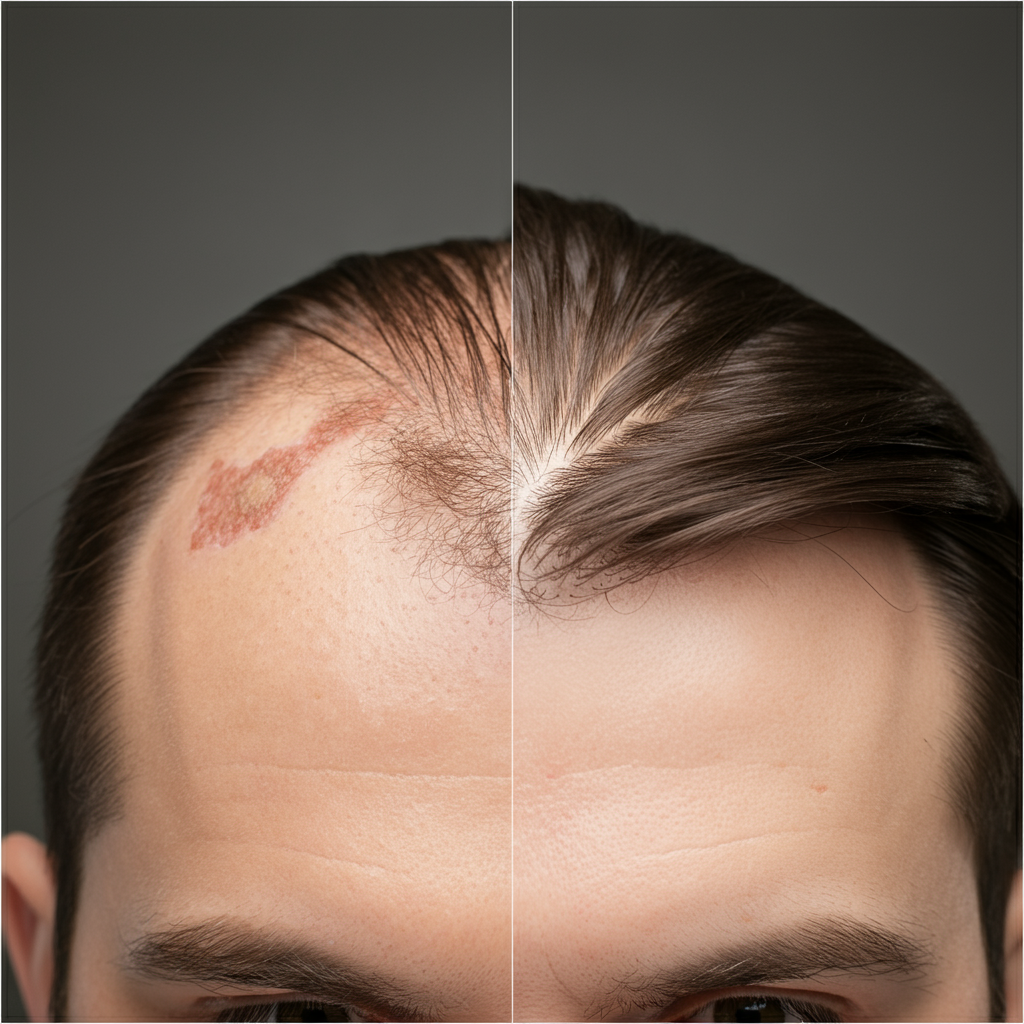
Hair loss is a concern that affects millions of people, from genetic predispositions to stress and lifestyle factors. For men, it’s often male-pattern baldness, while women may face hormone-induced thinning. The good news? There are natural and effective ways to prevent hair loss and even stimulate regrowth.
This blog dives into the causes of hair loss, various remedies, and proven techniques to stop balding and rejuvenate your locks naturally. Whether you’re dealing with thinning hair, bald spots, or shedding, you’ll find actionable tips and solutions to regain healthy, full hair.
Understanding Hair Loss
To tackle hair loss effectively, it’s crucial to understand the underlying causes and how the hair growth cycle works.
The Hair Growth Cycle
Hair grows in cycles, with each strand undergoing three phases:
- Anagen (Growth Phase): This is when hair actively grows. It can last 2-6 years for healthy individuals.
- Catagen (Transition Phase): A short phase (about 2 weeks) where growth slows and the hair follicle prepares for rest.
- Telogen (Resting Phase): The hair rests for 2-4 months before falling out, making room for new growth.
Disruptions to this cycle, caused by factors like stress, hormones, or illness, can lead to increased shedding or thinning.
Causes of Hair Loss
- Genetics: Androgenetic alopecia (male and female-pattern baldness) is the most common cause, influenced by hereditary factors.
- Hormonal Changes: Fluctuations, such as postpartum changes or menopause, can trigger thinning.
- Stress: High stress can lead to telogen effluvium, where hair sheds dramatically.
- Medical Conditions: Conditions like thyroid issues and alopecia areata contribute to hair loss.
- Nutritional Deficiencies: A lack of nutrients like biotin, iron, and zinc can weaken hair follicles.
Scarring vs. Non-Scarring Alopecia
- Scarring Alopecia: This occurs when hair follicles are permanently damaged (e.g., by infections or autoimmune conditions). Treatments can slow progression but may not restore growth.
- Non-Scarring Alopecia: A reversible condition caused by factors like stress, hormone imbalances, or nutritional issues.
Remedies and Lifestyle Changes
Certain changes to your lifestyle and hair care routine can significantly impact the health of your hair.
1. Improve Your Diet
Diet plays a vital role in supporting hair growth. Focus on:
- Protein: Hair is made of keratin, a protein. Eat eggs, chicken, fish, and legumes.
- Iron: Boost circulation to your scalp with iron-rich foods like spinach, red meat, and lentils.
- Omega-3s: Found in fatty fish like salmon, omega-3s nourish hair follicles.
- Vitamins & Minerals: Include Vitamin D, Zinc, Vitamin C, and Biotin for strong, healthy strands.
Avoid crash diets, as rapid weight loss can lead to hair shedding.
2. Manage Stress
Stress significantly impacts your hair’s health. Incorporate practices that calm your mind and body, such as:
- Yoga or meditation
- Deep breathing exercises
- Physical activities like jogging or swimming
Adequate sleep is also vital to prevent stress-induced hair loss.
3. Gentle Hair Care Practices
Protecting your existing hair is just as important as stimulating regrowth:
- Wash your hair with gentle, sulfate-free shampoos.
- Avoid excessive heat styling tools like straighteners and curling irons.
- Skip tight hairstyles, such as ponytails and braids, which can cause traction alopecia.
- Choose soft-bristle brushes to reduce breakage.
4. Scalp Massage
Massaging your scalp increases blood flow to the hair follicles, encouraging growth. Use natural oils like:
- Rosemary Oil: Known for stimulating hair regrowth.
- Pumpkin Seed Oil: Boosts hair thickness.
- Tea Tree Oil: Reduces scalp inflammation.
Apply a few drops, massage gently in circular motions, and rinse after 30 minutes.
5. Essential Oils
Essential oils can supplement your hair care routine. They’re easy to use and can be applied directly to the scalp (diluted with a carrier oil like coconut oil). Effective options include:
- Peppermint Oil: Improves blood circulation.
- Lavender Oil: Reduces stress and promotes healthy hair.
- Jojoba Oil: Hydrates the scalp and prevents dryness.
Supplements and Advanced Treatments
When lifestyle changes alone aren’t enough, supplements and other treatments can support hair regrowth.
1. Key Vitamins and Minerals
Consider supplements like:
- Biotin and Folic Acid: Strengthen hair and prevent thinning.
- Selenium & Zinc: Support follicle health.
- Vitamin D & Iron: Promote overall scalp health.
Always consult a healthcare provider before beginning new supplements.
2. Low-Level Laser Therapy (LLLT)
This non-invasive treatment uses red and near-infrared light to stimulate hair follicles and promote cell repair. Devices like laser caps are available for at-home use.
Medical Treatments
If natural remedies don’t provide the desired results, several medical treatments may help.
1. Minoxidil (Rogaine)
An over-the-counter topical solution applied to the scalp, Minoxidil stimulates hair follicles and extends the growth phase. Consistency is key, and results may take up to four months.
2. Finasteride (Propecia)
Available by prescription, Finasteride works by reducing DHT levels, a hormone responsible for shrinking hair follicles in male-pattern baldness. It’s effective but primarily recommended for men.
3. PRP Therapy
Platelet-Rich Plasma therapy involves injections of your blood plasma into the scalp to boost follicle health. It’s a more advanced option for moderate to severe hair loss.
4. Hair Transplants
For extensive bald patches, a surgical transplant of follicles from donor areas can provide a long-lasting solution.
5. Antioxidant Treatments
Topical products infused with antioxidants minimize oxidative stress, improving scalp conditions and reducing hair fall.
Hair regrowth requires patience and consistency. Incorporate these habits into your routine:
- Stay hydrated by drinking plenty of water.
- Exercise regularly to promote blood circulation.
- Quit smoking, as it restricts blood flow to the follicles.
- Protect your hair from sun damage by wearing hats or applying UV-protectant products.
Take Control of Hair Loss Today
Hair loss is a common issue, but it doesn’t have to define your confidence or style. By understanding its causes and taking proactive steps with natural remedies, supplements, and advanced treatments, you can improve both your scalp’s health and your hair’s vitality.
If you’re feeling overwhelmed about where to start, consulting a dermatologist can help tailor a treatment plan that works for you. Whether you’re adding biotin-rich foods to your diet, applying essential oils, or considering Minoxidil, consistency will be your most powerful tool.
For further guidance and personalized solutions, explore expert-recommended products and resources designed to restore your hair naturally.







